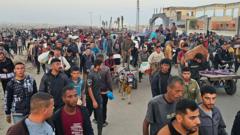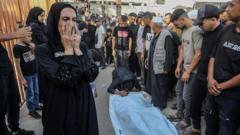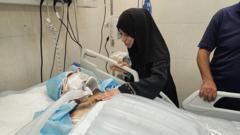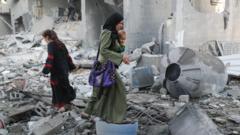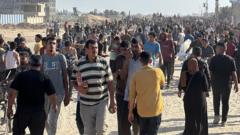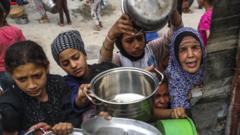As the situation deteriorates, the humanitarian crisis in Gaza heightens following the evacuation of the last operating hospital in the region.
Evacuation of Last Hospital in North Gaza Marks Dire Health Crisis
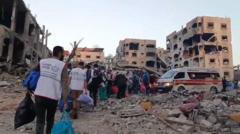
Evacuation of Last Hospital in North Gaza Marks Dire Health Crisis
North Gaza's health services crippled after al-Awda hospital evacuation amid escalating conflict.
The last operational hospital in the North Gaza governorate, al-Awda, has ceased operations following an immediate evacuation ordered by the Israeli military, according to the facility's director, Dr. Mohammed Salha. Patients were moved from the hospital in Jabalia late on Thursday, after what Dr. Salha described as "two weeks of siege." The Israeli Defense Forces (IDF) have not commented on the evacuation or ongoing conditions in the area.
The evacuation coincides with ongoing negotiations for a ceasefire. Hamas is reportedly reviewing a US proposal that has received Israel's approval. In a statement, President Donald Trump expressed optimism that a deal was "very close." However, Hamas has indicated that the plan does not align with its fundamental demands, specifically pertaining to a cessation of hostilities and the treatment of hostages. The agreement is said to offer a 60-day halt in fighting with the promise of humanitarian aid and the release of hostages on both sides.
The intensity of the violence has not abated, with the Gaza health ministry reporting at least 72 fatalities due to Israeli strikes within the last 24 hours alone. Humanitarian conditions are described by both the World Health Organization (WHO) and UN officials as critical. As Dr. Salha recounted his experience, he highlighted the threats made by Israeli forces, who cautioned that failure to evacuate would result in harm to medical staff and patients.
After prolonged negotiations, al-Awda's evacuation was executed around 20:30 local time, necessitating the transport of patients over 300 meters to ambulances positioned away from the hospital due to destroyed access roads. Video footage, provided by hospital staff, depicted the desperate scene as personnel attempted to secure the safe transport of patients.
Dr. Salha noted that, following the evacuation, patients would now receive care through a primary health center in Gaza City. WHO Director-General Tedros Adhanom Ghebreyesus emphasized that this closure effectively leaves the North Gaza area without health services, which is alarming amid ongoing conflict and humanitarian strife.
Al-Awda had remained operational until now, although it had been previously marked as an evacuation zone. The IDF claimed they targeted "terrorist assets," denying any siege on the hospital itself. However, reports from humanitarian organizations have indicated repeated strikes on the hospital, resulting in significant damage.
Moreover, the UN humanitarian agency OCHA has highlighted a grim picture, with only a fraction of primary health care centers functioning and numerous humanitarian aid efforts beset by challenges and accusations from various parties involved.
The humanitarian situation remains precarious as aid pressures mount. Israel's blockade, aimed at curtailing Hamas, has severely affected the influx of essential goods, causing remarks from international leaders—including French President Emmanuel Macron—demanding immediate action for more substantial humanitarian assistance.
As the people of Gaza face increasing desperation, UN agencies have voiced concerns over potential famine, labeling the conditions as dire and calling for immediate relief efforts. The situation reflects a deepening humanitarian crisis as conflict continues unabated and basic health services can no longer be guaranteed for the region's population.
The evacuation coincides with ongoing negotiations for a ceasefire. Hamas is reportedly reviewing a US proposal that has received Israel's approval. In a statement, President Donald Trump expressed optimism that a deal was "very close." However, Hamas has indicated that the plan does not align with its fundamental demands, specifically pertaining to a cessation of hostilities and the treatment of hostages. The agreement is said to offer a 60-day halt in fighting with the promise of humanitarian aid and the release of hostages on both sides.
The intensity of the violence has not abated, with the Gaza health ministry reporting at least 72 fatalities due to Israeli strikes within the last 24 hours alone. Humanitarian conditions are described by both the World Health Organization (WHO) and UN officials as critical. As Dr. Salha recounted his experience, he highlighted the threats made by Israeli forces, who cautioned that failure to evacuate would result in harm to medical staff and patients.
After prolonged negotiations, al-Awda's evacuation was executed around 20:30 local time, necessitating the transport of patients over 300 meters to ambulances positioned away from the hospital due to destroyed access roads. Video footage, provided by hospital staff, depicted the desperate scene as personnel attempted to secure the safe transport of patients.
Dr. Salha noted that, following the evacuation, patients would now receive care through a primary health center in Gaza City. WHO Director-General Tedros Adhanom Ghebreyesus emphasized that this closure effectively leaves the North Gaza area without health services, which is alarming amid ongoing conflict and humanitarian strife.
Al-Awda had remained operational until now, although it had been previously marked as an evacuation zone. The IDF claimed they targeted "terrorist assets," denying any siege on the hospital itself. However, reports from humanitarian organizations have indicated repeated strikes on the hospital, resulting in significant damage.
Moreover, the UN humanitarian agency OCHA has highlighted a grim picture, with only a fraction of primary health care centers functioning and numerous humanitarian aid efforts beset by challenges and accusations from various parties involved.
The humanitarian situation remains precarious as aid pressures mount. Israel's blockade, aimed at curtailing Hamas, has severely affected the influx of essential goods, causing remarks from international leaders—including French President Emmanuel Macron—demanding immediate action for more substantial humanitarian assistance.
As the people of Gaza face increasing desperation, UN agencies have voiced concerns over potential famine, labeling the conditions as dire and calling for immediate relief efforts. The situation reflects a deepening humanitarian crisis as conflict continues unabated and basic health services can no longer be guaranteed for the region's population.

